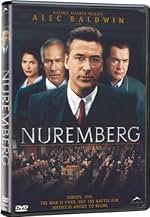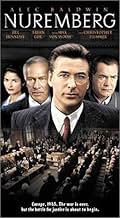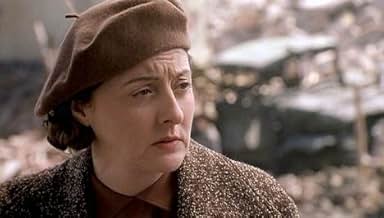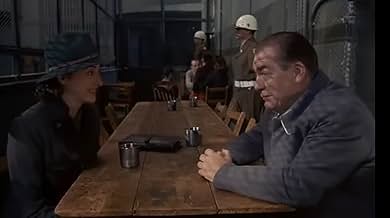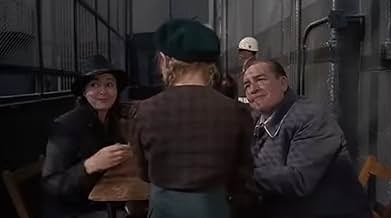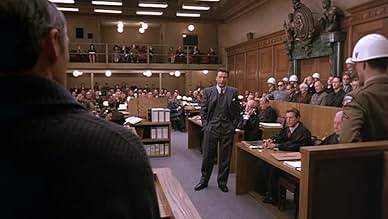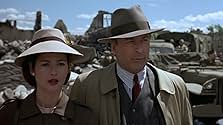ÉVALUATION IMDb
7,3/10
7,3 k
MA NOTE
Compte rendu dramatisé des procès pour crimes de guerre qui ont suivi la défaite de l'Allemagne nazie pendant la Seconde Guerre mondiale.Compte rendu dramatisé des procès pour crimes de guerre qui ont suivi la défaite de l'Allemagne nazie pendant la Seconde Guerre mondiale.Compte rendu dramatisé des procès pour crimes de guerre qui ont suivi la défaite de l'Allemagne nazie pendant la Seconde Guerre mondiale.
- A remporté 2 prix Primetime Emmy
- 10 victoires et 33 nominations au total
Parcourir les épisodes
Avis en vedette
`Nuremburg' is a chilling and disturbing look at the Nuremberg trial of Nazi war criminals after WWII. The story is historically accurate and captures the political and psychological climate of the times. It also serves as a distressing reminder to a young generation that has not experienced war in its lifetime of the horrors of which humanity is capable.
The film examines a number of fascinating angles of the trial. Instead of just focusing on the trial itself (of which there is plenty), it also offers a look at the political rivalry and infighting of the victorious nations, and a number of character studies of the prisoners. The most prominently portrayed of these is Hermann Göring (Brain Cox), Reich Marshall of the Third Reich and a member of Hitler's inner circle. Göring is portrayed as a cunning and charismatic adversary, who almost succeeds at making a sham of the entire trial.
The haunting question that must pervade anyone's mind that ponders the atrocities that occurred in WWII Germany is verbalised in the film by Elsie Douglas (Jill Hennessey). She says, `How could civilised human beings ever do that to other civilised human beings?', to which Justice Jackson (Alec Baldwin) replies, "Maybe civilization is overrated." This film provides some insight into the motivation of the German leaders, examining the warped perspective of the perpetrators who attempt to rationalise the horrors they committed to themselves and to the court. They point to the German sense of duty and obedience that is ingrained into their culture. After all, they were only following orders. There is also the undercurrent of Hitler's ruthlessness in using the SS to eliminate all opposition. In a particularly lucid moment, Göring says that if you look up and down the cellblock all you see is `yes men' because all the `no men' are six feet underground. Göring also points out the hypocrisy of the criticism of German hatred of the Jews by a U.S. society that interred millions of Japanese citizens, and tolerates segregation and hate-crimes against blacks.
Certainly, this is no justification for the systematic annihilation of 10 million of their own citizens, and as the film progresses a number of the prisoners begin to express deep remorse for their actions. Still, it shows that these weren't a group of sociopathic monsters in the conventional sense. They were otherwise normal men who had accomplished the inconceivable by dehumanising their victims to the point where the horrors they committed every day were no more disturbing to them than hunting deer to trim the herd. This is the most frightening thought of all, because it portends the possibility that such unthinkable acts could happen again. As long as we are able to believe that these men were a gaggle of homicidal maniacs, a freak societal aberration, we can reassure ourselves that this couldn't ever recur. However, when it dawns on us that normal people are able to rationalize such behaviour, we realise that under the right circumstances the potential for such inhumanity always exists. Complacency is an inadvertent ally of oppression, and this film should shock even the most casual viewer out of it. In this regard, it is instructive and enlightening.
The direction by Yves Simoneau is excellent and rises well above his mostly TV credits. The mood of the period is realistically rendered with a great deal of period accuracy. The costumes and period props are excellent with an eye for detail. He does an outstanding job creating background reaction shots, especially among the prisoners, that show their sarcastic disdain for their captors and display their smug superiority. He brings great power to numerous scenes using various camera angles. The holocaust footage used is some of the most disconcerting and inclusive I have ever seen. If there is any criticism to be leveled against the crafting of this film, it is that it delved too deeply into minutia, especially the sexual undercurrents between Jackson and Elsie Douglas. However, given the fact that it was produced as a TNT miniseries, the director was forced to fluff it up for the additional runtime.
The acting is also outstanding. Alec Baldwin gives a solid performance as Robert Jackson, a man obsessed with justice. Baldwin has never been known for his passion, but he elevates his game in certain parts of this film. Jill Hennessey is also excellent as Elsie, rendering her as a tough and smart woman who is a guiding force in the entire proceeding. However, by far the best performance is delivered by Brain Cox as Göring. His is a brilliant and complex performance that brings the reprehensible and magnetic Nazi leader to life in a way that is both attractive and loathsome. Colm Feore also gives a spine tingling performance as Rudolf Höss, the Commandant of Auschwitz concentration camp, who cavalierly discusses the efficiency techniques of eliminating prisoners, with the cold precision of an industrial engineer.
This terrific drama rises far above its TV roots. I rated it a 9/10. It is important viewing which reminds us that we cannot become complacent about tyranny, and we must be ever vigilant to guard against its recurrence.
The film examines a number of fascinating angles of the trial. Instead of just focusing on the trial itself (of which there is plenty), it also offers a look at the political rivalry and infighting of the victorious nations, and a number of character studies of the prisoners. The most prominently portrayed of these is Hermann Göring (Brain Cox), Reich Marshall of the Third Reich and a member of Hitler's inner circle. Göring is portrayed as a cunning and charismatic adversary, who almost succeeds at making a sham of the entire trial.
The haunting question that must pervade anyone's mind that ponders the atrocities that occurred in WWII Germany is verbalised in the film by Elsie Douglas (Jill Hennessey). She says, `How could civilised human beings ever do that to other civilised human beings?', to which Justice Jackson (Alec Baldwin) replies, "Maybe civilization is overrated." This film provides some insight into the motivation of the German leaders, examining the warped perspective of the perpetrators who attempt to rationalise the horrors they committed to themselves and to the court. They point to the German sense of duty and obedience that is ingrained into their culture. After all, they were only following orders. There is also the undercurrent of Hitler's ruthlessness in using the SS to eliminate all opposition. In a particularly lucid moment, Göring says that if you look up and down the cellblock all you see is `yes men' because all the `no men' are six feet underground. Göring also points out the hypocrisy of the criticism of German hatred of the Jews by a U.S. society that interred millions of Japanese citizens, and tolerates segregation and hate-crimes against blacks.
Certainly, this is no justification for the systematic annihilation of 10 million of their own citizens, and as the film progresses a number of the prisoners begin to express deep remorse for their actions. Still, it shows that these weren't a group of sociopathic monsters in the conventional sense. They were otherwise normal men who had accomplished the inconceivable by dehumanising their victims to the point where the horrors they committed every day were no more disturbing to them than hunting deer to trim the herd. This is the most frightening thought of all, because it portends the possibility that such unthinkable acts could happen again. As long as we are able to believe that these men were a gaggle of homicidal maniacs, a freak societal aberration, we can reassure ourselves that this couldn't ever recur. However, when it dawns on us that normal people are able to rationalize such behaviour, we realise that under the right circumstances the potential for such inhumanity always exists. Complacency is an inadvertent ally of oppression, and this film should shock even the most casual viewer out of it. In this regard, it is instructive and enlightening.
The direction by Yves Simoneau is excellent and rises well above his mostly TV credits. The mood of the period is realistically rendered with a great deal of period accuracy. The costumes and period props are excellent with an eye for detail. He does an outstanding job creating background reaction shots, especially among the prisoners, that show their sarcastic disdain for their captors and display their smug superiority. He brings great power to numerous scenes using various camera angles. The holocaust footage used is some of the most disconcerting and inclusive I have ever seen. If there is any criticism to be leveled against the crafting of this film, it is that it delved too deeply into minutia, especially the sexual undercurrents between Jackson and Elsie Douglas. However, given the fact that it was produced as a TNT miniseries, the director was forced to fluff it up for the additional runtime.
The acting is also outstanding. Alec Baldwin gives a solid performance as Robert Jackson, a man obsessed with justice. Baldwin has never been known for his passion, but he elevates his game in certain parts of this film. Jill Hennessey is also excellent as Elsie, rendering her as a tough and smart woman who is a guiding force in the entire proceeding. However, by far the best performance is delivered by Brain Cox as Göring. His is a brilliant and complex performance that brings the reprehensible and magnetic Nazi leader to life in a way that is both attractive and loathsome. Colm Feore also gives a spine tingling performance as Rudolf Höss, the Commandant of Auschwitz concentration camp, who cavalierly discusses the efficiency techniques of eliminating prisoners, with the cold precision of an industrial engineer.
This terrific drama rises far above its TV roots. I rated it a 9/10. It is important viewing which reminds us that we cannot become complacent about tyranny, and we must be ever vigilant to guard against its recurrence.
This is a strange subject for a modern TV series designed to entice an audience to whom World War II is as distant as the Pelopenesian Wars. Yet this is a tough, well produced, historically accurate and thoroughly compelling film. Brian Cox steals the show with a masterful recreation of Hermann Goering as a beguiling rogue. And the production techniques excel, for example the sound track as silent film of the concentration camps is shown to the trial. It puts the horror in context without exploiting it or sensationalizing it. A brilliant piece of historical film making.
I have read a few books on the Nuremberg trials, as well as books on The Third Reich in general. Though the portrayals of the defendants were fairly accurate, they were not given the appropriate amount of air-time.I mean, without the defendants, there wouldn't have been a trial. Here's the top 10 things that should have been added (and especially subtracted from the movie.)
10) Should have emphasized the alliances between the defendants. Speer wasn't the only one to stand up to Goering. Von Schirach, Funk, and Fritzsche were all against Goering.
9) Give Defendent #2 Rudolf Hess more that four words.
8) Clarifiy why Hess goes crazy at the end.
7) Make sure the audience knows that Speer's penitence could be him saving his hide.
6) Emphasize that Franks conversion was due to him finding God.
5) Talk about the defendants personal lives, try to explain why they would commit these atrocities.
4) Tell what happened to the defendants who were acquitted or had their sentences carried out at Spandau.
3) They should of had the story include Von Schirach and Von Neurath, the youngest and the oldest defendants, so they would have more of a age perspective to the story.
2)All of the Defendants positions should have been named at least once.
1) The Jackson/Secretary affair probably took at'least a half an hour out of the mini-series, Which could have been dedicated to, I don't know, making sure the audience at least knows the defendant's's names. Besides, I don't now one person who saw that movie who actually liked the couple.
10) Should have emphasized the alliances between the defendants. Speer wasn't the only one to stand up to Goering. Von Schirach, Funk, and Fritzsche were all against Goering.
9) Give Defendent #2 Rudolf Hess more that four words.
8) Clarifiy why Hess goes crazy at the end.
7) Make sure the audience knows that Speer's penitence could be him saving his hide.
6) Emphasize that Franks conversion was due to him finding God.
5) Talk about the defendants personal lives, try to explain why they would commit these atrocities.
4) Tell what happened to the defendants who were acquitted or had their sentences carried out at Spandau.
3) They should of had the story include Von Schirach and Von Neurath, the youngest and the oldest defendants, so they would have more of a age perspective to the story.
2)All of the Defendants positions should have been named at least once.
1) The Jackson/Secretary affair probably took at'least a half an hour out of the mini-series, Which could have been dedicated to, I don't know, making sure the audience at least knows the defendant's's names. Besides, I don't now one person who saw that movie who actually liked the couple.
Quite a few reviewers seem to be taken by the historicity of this movie. It's true that many of the details are correct - but it is also true that many others are wildly incorrect. The most egregious one is the romantic liaison between Justice Jackson and his assistant. I guess that the producers introduced the romantic element for the sake of a wider appeal, but the fact is that, in light of the actual events, this looks ridiculous. Which is a shame, for the movie would have been far more valuable without that silliness. It's mostly because of this that I don't think that it deserves more than 5 points. The bright sides are Brian Cox's and Michael Ironside's performances, and also, but to a lesser extent, Christopher Plummer's and Matt Craven's. Alec Baldwin delivers the same kind of underwhelming performance that he usually does, and Jill Hennessy does whatever she can with her inane and fictitious part.
In summary, it could have been a good movie, but it is just a decent one.
In summary, it could have been a good movie, but it is just a decent one.
My first impression of this film was that it was excellently done. It provoked my curiosity and I am glad to say the film held up under my further investigation of the trials.
The accurate representation of the grayness of a subject most would consider black and white was particularly courageous. It would be easy to paint the Nazis as monsters without souls, but so often terrible things are done by perfectly ordinary people. In fact that is what is so terrible about people's actions in WWII. Malevolence would certainly be easier to accept than what this film shows was at the source of the Nazi behavior -- indifference and lack of empathy. Who hasn't felt indifference toward someone they met in everyday life, the cashier who was too slow, the person in the car ahead, the telemarketer?
The acting was excellent, particularly Brian Cox, who showed us how well charm can mask evil. I did not think Goering was white-washed. This was shown most clearly in his pathetic attempt to shrug off the concentration camp film. Even his manipulative skill couldn't ease that shock, and his American friend was silent. If Alex Baldwin pumped up his drama a little, well, take a look at transcripts of the trial, which are drier than the Sahara. The use of documents was extensive during the trial and how often does the layperson want to hear that? The use of the concentration camp film was a cold dash of water in the face of such dryness. Some other comments question the inclusion of the relationship between Jackson and his secretary. I didn't see it as a "love story", but more as an "adultery story" used to show on a more personal level that despite his side's claim to superior "morals" Jackson was also weak. I think the Soviet involvement and the Polish massacre was left out because it would have been too long to include in all its convolutions. It is an interesting part of the story, however, so I recommend researching it.
I was glad to see on the comments that those who know more than I pointed out its accuracy. Too rarely does Hollywood actually attempt that.
The accurate representation of the grayness of a subject most would consider black and white was particularly courageous. It would be easy to paint the Nazis as monsters without souls, but so often terrible things are done by perfectly ordinary people. In fact that is what is so terrible about people's actions in WWII. Malevolence would certainly be easier to accept than what this film shows was at the source of the Nazi behavior -- indifference and lack of empathy. Who hasn't felt indifference toward someone they met in everyday life, the cashier who was too slow, the person in the car ahead, the telemarketer?
The acting was excellent, particularly Brian Cox, who showed us how well charm can mask evil. I did not think Goering was white-washed. This was shown most clearly in his pathetic attempt to shrug off the concentration camp film. Even his manipulative skill couldn't ease that shock, and his American friend was silent. If Alex Baldwin pumped up his drama a little, well, take a look at transcripts of the trial, which are drier than the Sahara. The use of documents was extensive during the trial and how often does the layperson want to hear that? The use of the concentration camp film was a cold dash of water in the face of such dryness. Some other comments question the inclusion of the relationship between Jackson and his secretary. I didn't see it as a "love story", but more as an "adultery story" used to show on a more personal level that despite his side's claim to superior "morals" Jackson was also weak. I think the Soviet involvement and the Polish massacre was left out because it would have been too long to include in all its convolutions. It is an interesting part of the story, however, so I recommend researching it.
I was glad to see on the comments that those who know more than I pointed out its accuracy. Too rarely does Hollywood actually attempt that.
Le saviez-vous
- AnecdotesSam Stone, who plays Julius Streicher, is a Jew whose father survived the Holocaust. It was only with the greatest difficulty that he maintained an impassive face during the scene where films of Nazi concentration camps are shown in the courtroom. Upon completion of the scene, he immediately burst into tears.
- GaffesAt the end of the trial, Field Marshall Wilhelm Keitel is referred to as "Admiral Keitel."
- Citations
Reichsmarschall Hermann Wilhelm Göring: One German, a fine man. Two Germans, a bund. Three Germans, a war. One Englishman, an idiot. Two Englishmen, a club. Three Englishmen, an Empire.
- ConnexionsFeatured in The 58th Annual Golden Globe Awards 2001 (2001)
- Bandes originalesDeep in the Heart of Texas
Written by June Hershey and Don Swander
Performed by cast
Melody Lane Music c/o Peermusic International
Meilleurs choix
Connectez-vous pour évaluer et surveiller les recommandations personnalisées
- How many seasons does Nuremberg have?Propulsé par Alexa
Détails
- Date de sortie
- Pays d’origine
- Site officiel
- Langues
- Aussi connu sous le nom de
- Nürnbergprocessen
- Lieux de tournage
- sociétés de production
- Consultez plus de crédits d'entreprise sur IMDbPro
- Durée1 heure 30 minutes
- Couleur
- Mixage
- Rapport de forme
- 1.85 : 1
Contribuer à cette page
Suggérer une modification ou ajouter du contenu manquant



